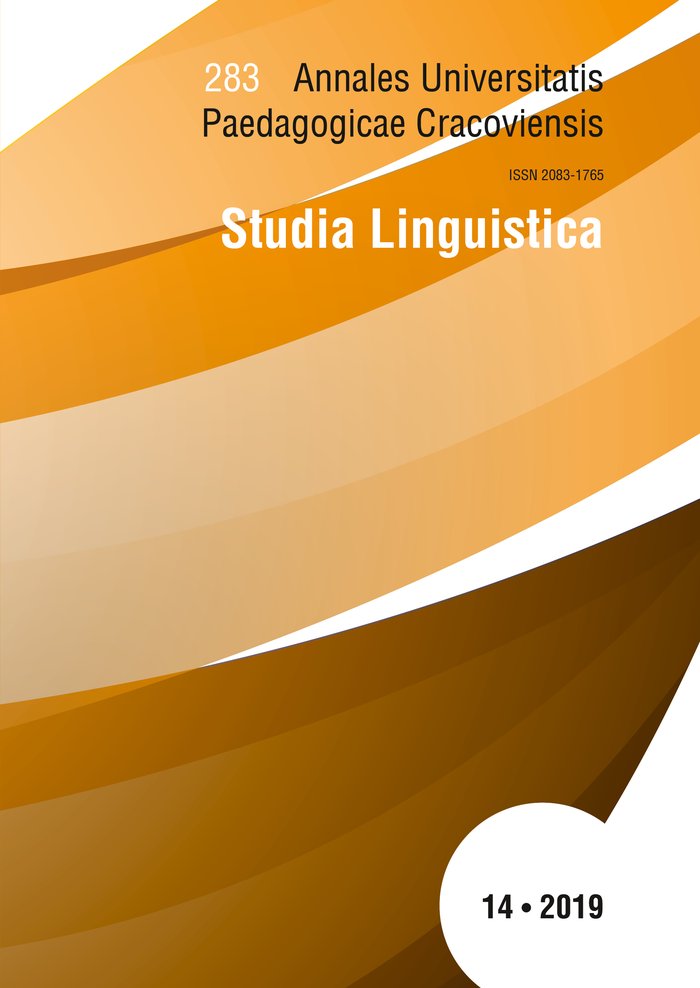About the idiomatic expression zamienić się w słup soli (‘to turn into a pillar of salt’)
Main Article Content
Abstract
This paper is dedicated to the description of the idiomatic expression zamienić się w słup soli in contemporary Polish. First of all, the origin of this word combination was presented, and next - its lexicographic condition. Moreover, phraseological modifications were discussed (exchange, development, shortening and regulation), which a given idiomatic expression undergoes. Linguistic material was excerpted from the National Corpus of Polish and Internet sites.
Downloads
Article Details
Author, submitting a text to the editorial board of the journal “Annales Universitatis Paedagogicae Cracoviensis. Studia Linguistica", certifies that the content of the article has not been published so far and that the work does not violate in any way the copyright or related rights of other person, as well as other rights of third parties, and that no one's rights to the work (or any part thereof) have been missed. After signing the contract, the property rights to the published materials are transferred to the Scientific Publisher of the University of the National Education Commission, Krakow.
“Annales Universitatis Paedagogicae Cracoviensis. Studia Linguistica” is an open access journal, and all its content is made available free of charge to users and institutions under the Creative Commons CC-BY-NC-ND 4.0 license (attribution, non-commercial use, no derivative works). Under this license, the authors agree that their work may be lawfully reused for any purpose, except for commercial purposes, without the prior consent of the author or publisher. Everyone can read, download, copy, print, distribute and process these works, provided that the author's marking and the original publication place are correct. Published texts may not be used to create derivative works (e.g. to translate and publish in another language without the consent of the publisher). This is in line with the BOAI (Budapest Open Access Initiative) definition. "Studia Linguistica" does not charge for submitting or processing articles.
References
Bąba S., 1971, Frazeologia biblijna i modlitewna w tytułach utworów literackich, „Język Polski” LI, z. 5, s. 358−364.
Google Scholar
Bąba S., 1992, Z życia wybranych zwrotów biblijnych we współczesnej polszczyźnie, [w:] Biblia a kultura Europy, red. M. Kamińska, E. Małek, Łódź, s. 167−177.
Google Scholar
Bąba S., 2009, Frazeologia polska. Studia i szkice, Poznań.
Google Scholar
Dziamska-Lenart G., 2007, Frazeologizmy biblijne w nowych słownikach frazeologicznych języka polskiego, [w:] Język religijny dawniej i dziś III, red. P. Bortkiewicz, S. Mikołajczak, Poznań, s. 205−213.
Google Scholar
Fliciński P., 2007, Z życia wybranych frazeologizmów biblijnych we współczesnej polszczyźnie, [w:] Język religijny dawniej i dziś III, red. P. Bortkiewicz, S. Mikołajczak, Poznań, s. 214−228.
Google Scholar
Horyń E., 2014, Leksem sól i jego derywaty w utrwalonych połączeniach wyrazowych, [w:] Parémie národů slovanských VII, red. E. Mrhačová, U. Kolberová, Ostrawa, s. 77−84.
Google Scholar
Kopaliński W., 2004, Słownik symboli, Warszawa.
Google Scholar
Koziara S., 2001, Frazeologia biblijna w języku polskim, Kraków.
Google Scholar
Koziara S., 2012, Tradycyjna frazeologia biblijna a nowe przekłady Pisma Świętego w języku polskim (na przykładzie tłumaczeń Ewangelii św. Mateusza), „Problemy Frazelogii Europejskiej” IX, red. A.M. Lewicki, Lublin, s. 9−22.
Google Scholar
Lewicki A.M., Pajdzińska A., Rejakowa B., 1987, Z zagadnień frazeologii. Problemy leksykograficzne, Warszawa.
Google Scholar

